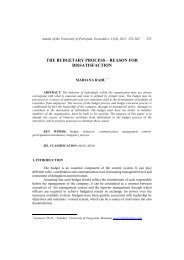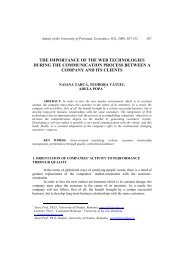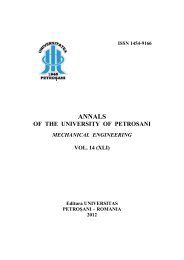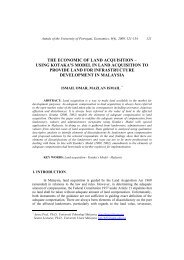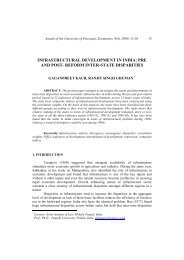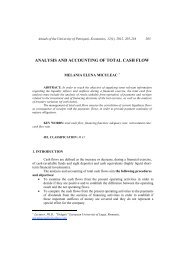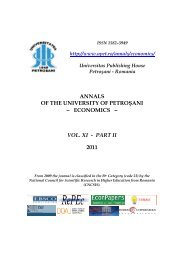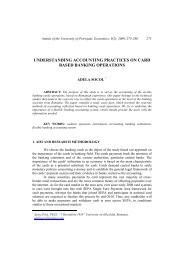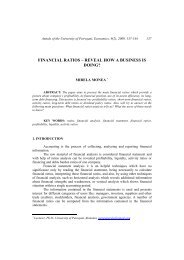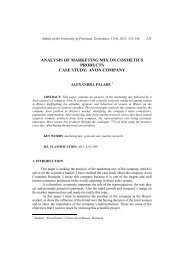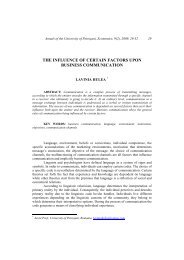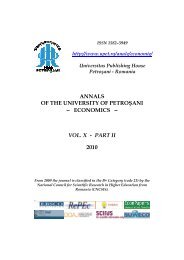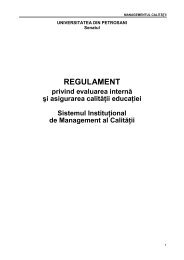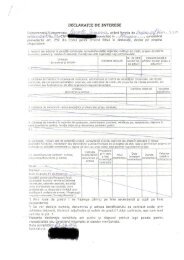annals of the university of petroÅani â¼ economics â¼ vol. xi - part i ...
annals of the university of petroÅani â¼ economics â¼ vol. xi - part i ...
annals of the university of petroÅani â¼ economics â¼ vol. xi - part i ...
You also want an ePaper? Increase the reach of your titles
YUMPU automatically turns print PDFs into web optimized ePapers that Google loves.
Forms <strong>of</strong> Tax Evasion in Romania. Analytical Perspective 37<br />
<strong>of</strong> legislative changes as well as in <strong>the</strong> context <strong>of</strong> providing support by fiscal policies in<br />
order to encourage certain economic sectors.<br />
Tax evasion can meet legal form as such:<br />
- permanent fiscal facilities (exemptions, reductions, deductions);<br />
- temporary fiscal facilities (for example, newly created companies taking advantage<br />
<strong>of</strong> this status for avoiding to pay income tax. Ano<strong>the</strong>r example <strong>of</strong> this kind is <strong>the</strong><br />
lax legislation in some countries that allow companies to opt for ei<strong>the</strong>r income tax<br />
for individuals or as capital for companies.<br />
- if <strong>the</strong> state is facing a high level <strong>of</strong> debt or an alarming trade deficit, <strong>the</strong>n it resorts<br />
to exempting from tax income revenues deriving from bank deposits or<br />
investments;<br />
- if <strong>the</strong>re are precise rules on company expenses, <strong>the</strong>n <strong>the</strong>re is <strong>the</strong> tendency to<br />
overestimate <strong>the</strong>m for deduction purposes. An example is <strong>the</strong> depreciation<br />
expenses that firms tend to overstate in comparison with <strong>the</strong> wear degree in order<br />
to reduce <strong>the</strong> tax base. For <strong>the</strong> same purpose <strong>the</strong>re can be manipulated <strong>the</strong><br />
hospitality expenses as well.<br />
- taxation made by certain socio-pr<strong>of</strong>essional categories based on average income<br />
rules that encourage taxpayers who have an income above average to not pay tax<br />
on that difference;<br />
- tax havens that are created in order to escape <strong>the</strong> tax authorities. Offshore<br />
companies are supportive to avoiding <strong>the</strong> payment <strong>of</strong> taxes, in order to increase<br />
pr<strong>of</strong>itability in a favorable macroeconomic environment, characterized by political<br />
stability, currency fle<strong>xi</strong>bility and absolute privacy.<br />
Tax haven is usually valorized in order to distort transparency <strong>of</strong> <strong>the</strong> income<br />
and to give rise to apparently reliable documents attesting to <strong>the</strong> long e<strong>xi</strong>stence <strong>of</strong> <strong>the</strong><br />
company. Although <strong>the</strong> e<strong>xi</strong>stence and <strong>the</strong> proper functioning <strong>of</strong> <strong>the</strong> company is<br />
essentially informal, being used only for tax purposes, apparently au<strong>the</strong>ntic documents<br />
are used to certify <strong>the</strong> credibility <strong>of</strong> <strong>the</strong> company, its solvency or value <strong>of</strong> property in<br />
relation to its business environment.<br />
Tax havens ground on: transactions apparently legal in accordance with <strong>the</strong><br />
laws known as tax planning. In general, tax planning in<strong>vol</strong>ves channeling pr<strong>of</strong>its from<br />
home company to <strong>the</strong> parent company implemented in <strong>the</strong> tax haven. These returns<br />
require services or export-import operations whose content is manipulated favorably;<br />
transactions that hide under <strong>the</strong> protection <strong>of</strong> legal unintended inaccuracies are<br />
considered circumstances <strong>of</strong> tax evasion. In this category <strong>the</strong>re are integrated captive<br />
insurance companies, investment companies and some companies providing various<br />
services done through tax havens.<br />
In both cases, reality is distorted in order to obtain considerable tax<br />
advantages. Fraud is done under <strong>the</strong> protection <strong>of</strong> geographical relocation, increased<br />
fiscal risk resulting in invaluable tax losses.<br />
3.1. The implementation <strong>of</strong> an <strong>of</strong>f-shore company in <strong>the</strong> business circuit<br />
A commercial transaction in<strong>vol</strong>ves <strong>the</strong> initial delivery <strong>of</strong> goods or services –<br />
<strong>the</strong> real flow that are subsequently charged, which generates cash flow. Tax base is <strong>the</strong>



